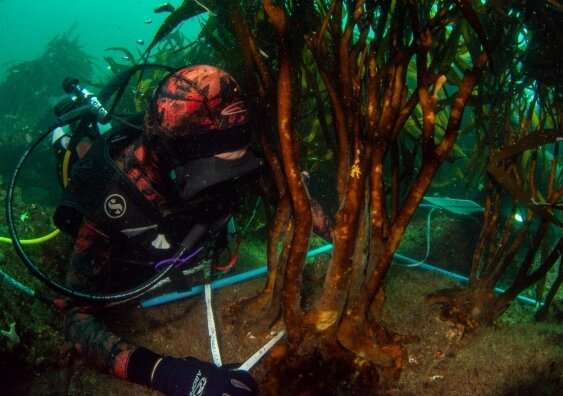A million hectares of kelp forests need planting by 2040, and scientists are asking for help

Marine ecologists from UNSW Sydney working to regrow kelp seaweed are calling on the public to participate in a global challenge to restore a million hectares of lost underwater forest by 2040.
The researchers are terming it The Kelp Forest Challenge to raise awareness of kelp forests and challenge everyone to work together towards a unified target. Individuals and businesses can share their time, resources, and expertise to help meet the goal.
The target area of kelp—which equates to an area about a sixth of the size of Tasmania—needs to be regrown in the next two decades to reverse a decline that has seen up to 95% of the canopy disappear in places like Tasmania and California. The grassroots movement also aims to protect an additional three million hectares of existing kelp forests in the same timeframe.
While similar habitats like coral reefs often get more attention, kelp forests are one of the most unique and productive ecosystems on earth. These vibrant underwater jungles of brown algae live in shallow waters off a third of the world’s coastlines and are incredible hubs of biodiversity. But threats like climate change and pollution have brought some kelp forests to the brink of extinction.
“Terrestrial forests and coral reefs have often been the focus of much-needed protection and restoration in recent years, but kelp forests are just as vital and are disappearing by the minute,” says Dr. Aaron Eger, Founder/Program Director of the Kelp Forest Alliance (KFA) and a marine ecologist from the School of Biological, Earth & Environmental Science, UNSW Science.
“On land, we have powerful high-level initiatives like the Bonn Challenge to restore deforested landscapes,” says Professor Adriana Vergés, a marine ecologist from the School of Biological, Earth & Environmental Science, UNSW Science, and a KFA director. “The Kelp Forest Challenge represents an equivalent ambitious target to protect and revitalize our underwater forests.”
Dr. Eger says while a pledge can be monetary, any positive contribution towards kelp forest conservation projects can count.
“This initiative aims to encourage and facilitate positive actions and communities that can protect what is remaining and restore what has been lost with an ambitious shared vision for ensuring our kelp forests and the benefits they provide thrive into the future,” Dr. Eger says. “We have media and marketing companies working to help promote kelp forests, dive companies loaning the needed equipment, and aquaculture groups helping produce seed stock.”
A coastal restoration movement
According to the Alliance’s best estimates, restoring 1 million hectares of lost kelp forest will require an initial investment of $40 billion but will produce tens of billions of dollars each year through a coastal restoration industry comprised of fisheries, blue carbon, and tourism.
“If we are successful, we can restore billions of dollars in ecosystem services, create hundreds of thousands of jobs, and rebalance the ocean to a place of abundance and beauty,” Dr. Eger says.
While most restoration projects to date have taken place on less than a hectare, larger-scale restoration is becoming more viable. Twenty organizations have already made pledges, including a 30,000-hectare restoration project in South Korea.
“We have seen an acceleration in the size of projects and scale of success above 100 hectares now,” Dr. Eger says. “As methods like transplanting are refined, knowledge is shared, and economies of scale emerge, the feasibility of this work will increase, and this project will only help accelerate it.”
The Kelp Forest Challenge targets were developed from intensive consultation among experts and those living and working in kelp ecosystems worldwide. It is led by the KFA, a UNSW-supported, research-driven not-for-profit founded by Dr. Eger, that brings together 450 kelp forest experts from 25 countries to accelerate the protection and restoration of kelp forests worldwide.
“We compiled the best available information on the known distribution of kelp, their past declines, the costs of restoration, and the technical capacity to do a restoration to propose this target value. We then considered how these scenarios fit in with other global initiatives to protect and restore ecosystems, like the UN Decade for Ecosystem Restoration,” Dr. Eger says.
The targets also align with the newly announced Kunming-Montreal Global Biodiversity Framework to protect and restore ecosystems. The potential for kelp to sequester carbon dioxide means that it may also contribute to commitments under the Paris Agreement.
“We would love to work with governments to achieve these targets and mobilize funding for restoration projects,” Dr. Eger says. “But we do not have time to wait for an international coalition to form and create a target, the need to act is too pressing.”
While we may be unable to entirely halt climate change by restoring a kelp forest, any progress towards their restoration is still a positive contribution.
“We further hope that the positive action we are putting forward helps shift the conversation to a more equitable and sustainable future, not just for kelp forests but all ecosystems under threat,” Dr. Eger says. “Alone we might be a drop, but together, we are an ocean.”
Citation:
A million hectares of kelp forests need planting by 2040, and scientists are asking for help (2023, February 20)
retrieved 20 February 2023
from https://phys.org/news/2023-02-million-hectares-kelp-forests-scientists.html
This document is subject to copyright. Apart from any fair dealing for the purpose of private study or research, no
part may be reproduced without the written permission. The content is provided for information purposes only.
For all the latest Science News Click Here
For the latest news and updates, follow us on Google News.

